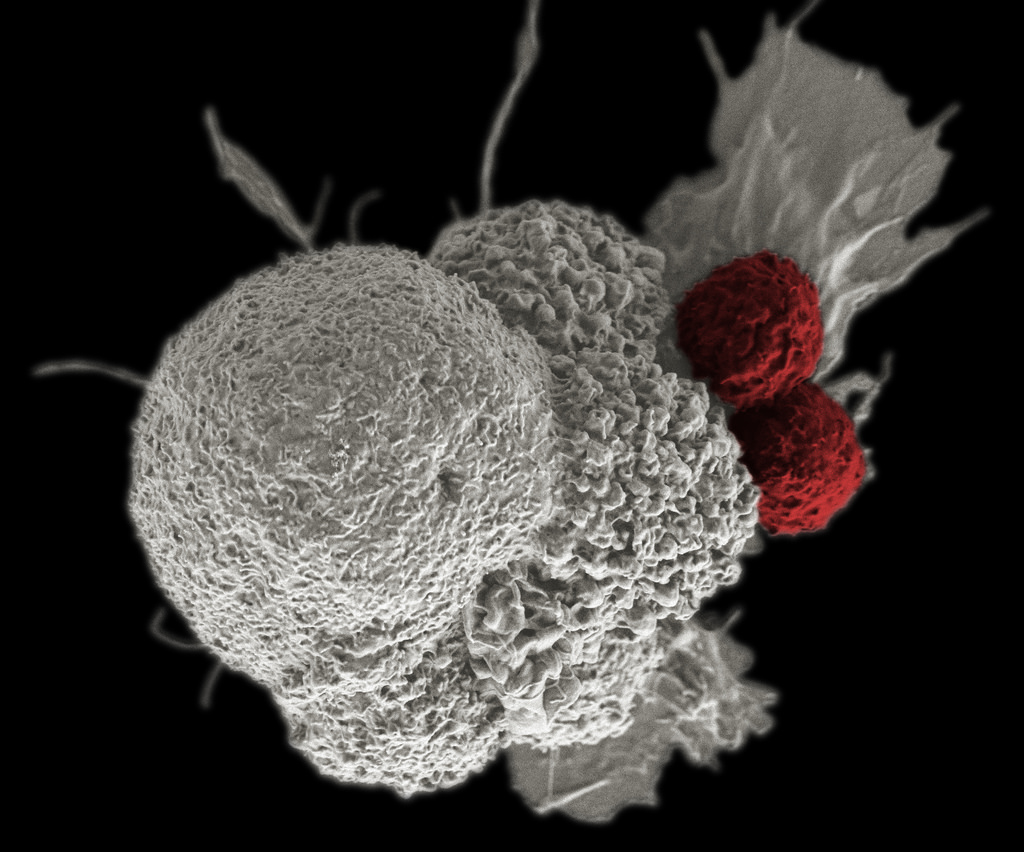What you need to know about immunotherapy

Harness the body’s own immune system to fight off attackers—this is the goal of immunotherapy, a rapidly evolving treatment approach for many diseases and especially cancer. But this therapy isn’t just for cancer, as it provides the hope of recovery from very serious illnesses such as Crohn's disease or multiple sclerosis, which traditional therapies have had limited success in treating.
In 2013, Science magazine named cancer immunotherapy as the breakthrough of the year.
Photo credit: Rita Elena Serda, Duncan Comprehensive Cancer Center at Baylor College of Medicine,
National Cancer Institute, National Institutes of Health
How immunotherapy works
Immunotherapy is a biological therapy that uses natural or artificial substances to imitate or block the natural reactions of a patient’s immune system cells. CellCAN’s network affiliates and its partners develop these therapies in their laboratories.
What is biological therapy?
Biological therapy involves the use of natural or artificial substances to catalyze or block the natural reactions of our body’s cells.
Immunotherapy
Immunotherapy is a type of biological therapy that reinforces the body’s immune system by helping it fend off attackers, like cancer cells.
There are two types of immunotherapy: Active immunotherapy and passive immunotherapy.
1. Active immunotherapy involves giving the immune system tools that reinforce its response against an attack. This category has two subgroups: Active non-specific and active specific immunotherapy.
- Active non-specific immunotherapy: This therapy aims to stimulate the immune system in a very broad way so that it is able to attack a pathogen. This is a long-standing approach in immunotherapy that uses a family of molecules in the body called cytokines. These molecules control other immune cells and play a central role in the immune response. The most common therapy is called interferon therapy, which is used to treat certain types of leukemia and lymphoma and even to treat and control diseases like multiple sclerosis and hepatitis.
- Active specific immunotherapy: In this type of therapy, doctors try to obtain a more specific and targeted reaction. These techniques are also called “therapeutic vaccines” and seem particularly promising because of their ability to fight a specific attacker.
2. Passive immunotherapy uses lab-engineered substances that are designed to act like certain parts of the immune system and to attack specific cells. The process involves administering antibodies that directly target cancer cells.
Diseases treated with immunotherapy
Immunotherapy has promising potential to treat many types of diseases, such as:
- Cancers
- Infectious diseases
- Allergies
Given the potential of immunotherapy, this list of diseases could grow as research in the field advances.
The challenge of cancer
We still have a long road ahead before we have fully effective treatments for cancers with complex mechanisms. One problem is that cancer cells can spread pretty easily in the body because the immune system doesn’t see them as an invader. Researchers are trying to overcome this obstacle with immunotherapy. The idea is to “educate” the immune system so that it recognizes cancer cells as an enemy that it needs to fight.
CAR-T cells: A living medication
CAR-T cells (or “chimeric antigen receptor T cells”) are T lymphocytes that are taken from a patient and genetically modified in a lab so that they express an artificial receptor (called a chimeric receptor). This receptor is designed so that it recognizes cancer cells as specifically as possible to prevent adverse effects on the patient’s other organs. This new form of immunotherapy is therefore a combination of cell therapy and gene therapy.
|
Other immunotherapy research avenues
- Understanding why immunotherapy works in some patients and not in others
- Widen the application of immunotherapy to more cancers and other diseases
- Increase the effectiveness of immunotherapy by combining it with other cutting-edge and personalized treatments
Find out more